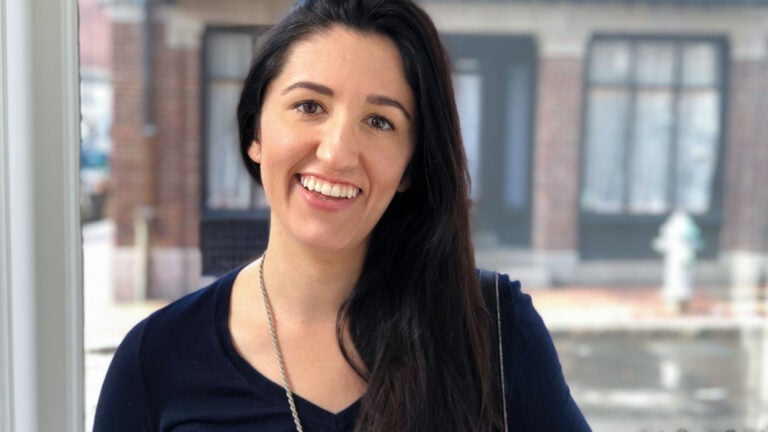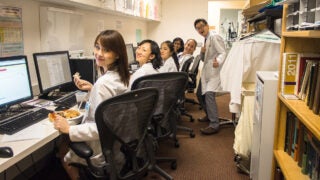
Franco Pillsbury is combining her medical training with a degree in public policy in order to best reach the children she wants to help. (Photo/Catia Sharp)
Future doctor answers the call to study medical problems with social causes
Frances Pillsbury takes time off from the Keck School of Medicine of USC to complete a Master in Public Policy program at Harvard
Frances “Franco” Pillsbury is a student between her second and third years at the Keck School of Medicine of USC. She is currently at Harvard’s John F. Kennedy School of Government, completing a two-year Master in Public Policy program. She spoke to Paul Boutin of USC News.
As a second-year medical student, I had come to the certainty that I wanted to help children with special needs in state dependency and delinquency systems. But to effect change in the huge systems that serve vulnerable children would require more than a clinical background. Many of their medical problems have huge social causes. That’s why I’m currently in my second year of a two-year Master in Public Policy program at Harvard Kennedy School.
Med school by nature isn’t designed to address these causes. Harvard’s program combines courses in economics, politics, policy analysis, management and leadership, negotiations, ethics and quantitative analysis, to give graduates with medical training an additional range of skills for affecting public policy.
Teresa Cook, the Keck School’s director of Student Affairs, alerted me that there was a scholarship opportunity for the Harvard program. Go now, she said, so you can keep your clinical third and fourth years together at [USC]. Donna Elliott (senior associate dean for Student and Educational Affairs) and Ankit Shah in clinical pediatrics were very supportive. They helped me determine it was the right path for me, then made it easy for me to navigate the process.
Today, it’s been estimated that up to 80 percent of children in foster care have significant mental health issues — four times the average for the general population. The professionals attempting to care for them face obstacles on many fronts, ranging from top-down organizational disconnects to the personal challenge of caring for an individual child whose life has already been disrupted. Psychiatrists don’t have a lot of options, which often leads to overmedication of foster children simply to keep them from hurting others or themselves.
Moreover, how do these children transition from a foster childhood to life as an adult in the real world? I see similar problems at transition points throughout the mental health care. I’m currently working with the state of Rhode Island to improve state psychiatric hospital discharge planning. It’s often hard to create a plan that lets adults with mental health issues function in the world, in a way that also respects their autonomy.
What works — and what doesn’t — in a data-driven world
Much of the work is data-driven, correlating medical claims data and hospital claims data, among others, to find what works and what, too often, doesn’t. We look at the available data to ask who has bad outcomes. Each person can then be looked at individually, but the interaction among forces ranging from cellular to societal in scope is key to understanding how best to address them.
I’m half-adopted. My mother — now deceased — was incarcerated in the juvenile justice system as a teenager. I saw my dad make many personal sacrifices to bring stability to my often chaotic childhood. I’m sure I could have responded to their examples in several ways, but I see a glaring need: There are very few people in the space bridging clinical and policy knowledge to help society’s most vulnerable children. I could drown in hopelessness and cynicism. I could remove myself from the issue to avoid becoming another case of medical career burnout. Instead I’ve chosen to bring something different to the table in an area where I feel not only uniquely empowered, but truly needed.



